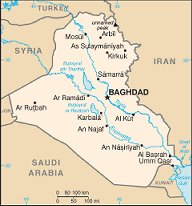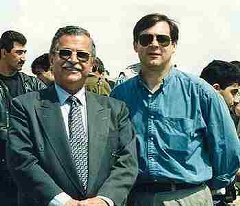

 |
 |
I first met Ahmad Chalabi in 1995 in northern Iraq , although my CIA brethren had been working with him since 1994. There was a special access covert operation in the Directorate of Operations/Near East/Iraqi Operations Group (NE/IOG) where I was assigned. At the time, it was extremely sensitive, but now is all over the media. Known by the cryptonym DBACHILLES (DB indicated Iraq), it consisted of agency officers and military officers from CENTCOM. I was read into the program since I was headed out to execute some of their programs in northern Iraq, and eventually Kuwait and Jordan.
On my first rotation into northern Iraq, I was the only DOD person on the team. I was invited to accompany the team chief (an agency officer) to dinner with Chalabi. I had heard the stories, but had never met the man. I was about to meet the man into whose basket we had put most of our eggs for the overthrow of Saddam Husayn. He was from a wealthy, influential Baghdadi Shi'a family, educated at MIT, international financier, etc. Enter the USAF officer from Pittsburgh.... I had heard of the conviction in absentia by a Jordanian court for a huge financial scandal - hundreds of millions of dollars, We (the agency) used our influence with King Hussein to have the criminal case put in abeyance because we needed Chalabi - he was the only viable option for the removal of Saddam at the time. Even after we (actually, it was the British Secret Intelligence Service, MI-6 - yes, they do exist) found Iyad 'Alawi's Iraq National Accord (the "Wifaq") in 1996, we continued to support Chalabi as well.
Anyway, back to dinner. The chief and I show up at Chalabi's house in Salah Al-Din (our headquarters as well, sort of between Mosul and Kirkuk). As we pull up - of course, we are armed and dangerous - we see a Mercedes driving away. We thought we recognized the car as belonging to the "Iranian Red Crescent" representative in the region. We go into the house, where Chalabi is as white as a sheet. It seems that the Iranian Red Crescent representative, in reality, the chief of our Iranian Islamic Revolutionary Guard Corps (the Sepah Pasdaran) counterpart team - yeah, we all knew each other were there, but operated under a kind of "peaceful coexistence" agreement - had paid him a visit. The IRGC guy told him that we could all work together against Saddam, but as soon as that effort appeared to be anti-Iran, his (Chalabi's, and by extension, ours) days were numbered. (This is why when the attack on our house happened, I thought I was returning fire against Iranians, but they all look alike through the smoke/sweat/haze/adrenalin....)
He took them seriously - so did we. On many occasions, I had to go to our other location in As-Sulaymaniyah (east of Kirkuk), the primary city of the Patriotic Union of Kurdistan (Jalal Talabani).
I preferred to work with them, as I thought they were more trustworthy and a bit more western than the Kurdish Democratic Party (Mas'ud Barzani). While there, they put us up in their guest house, what we would call a contract hotel. On one trip, the agency guy and myself were assigned a room next to a group of rooms housing the IRGC contingent in town. Interesting trips to the dining room and common areas. Although by this time the Kurds had succeeded in passing and enforcing ordinances against carrying weapons in town, there was no way either we nor the Iranians were going to be sleeping on the other side of a wall without weapons. Go to dinner, lay your folding stock AK-47 on the table so they could see it - they'd do the same. I wonder who was more afraid of the other.... I am sure the poor staff felt caught in the middle of this geopolitical "who has the bigger schlong" contest. You know, I always looked at the IRGC guys, my age and younger, as counterparts just doing their jobs with the same dedication I had. There was nothing personal, and I never felt a need to overreact.
See http://www.francona.com/kurd for related photos.